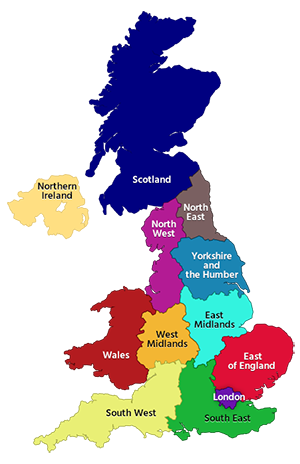Living Wills and Advance Decisions in the UK
A living will is a document which specifies what kind of medical care a patient wants in case he/she becomes terminally ill and cannot speak on his own behalf. In other words it provides guidance as regards the course of action which the person desires from physicians or medical care providers as far as life-sustaining treatments are concerned. Living Wills are legally binding and are sometimes referred to as an Advance Decision or even and Advance Decision to Refuse Treatment (ADRT). An online and free provider of ADRTs / Living Wills is myADRT.com.Three easy ways to find the Living Wills and Advance Decisions company you are looking for:
- Select the area on the map below where you are looking for a Living Wills and Advance Decisions company.
- Click the region to show the Living Wills and Advance Decisions companies located there: Northern Ireland, Scotland, North East England, North West England, Yorkshire Humber, Wales, West Midlands, East Midlands, East England, South East England and London, South West England UK.
- Enter your postcode to find the closest Living Wills and Advance Decisions companies to you:


A living will is a type of advance directive. It allows you to express your preferences for medical treatment in the future when you are too ill or injured to state these yourself, because it isn't clear whether you lack the capacity to decide. A living will is a document which specifies what kind of medical care a patient wants in case he/she becomes terminally ill and cannot speak on his own behalf. In other words it provides guidance as regards the course of action which the person desires from physicians or medical care providers as far as life-sustaining treatments are concerned.
Contents of living wills may include instructions on different types of care (such as surgical, medical and dental procedures) and treatments (including life-sustaining treatments such as artificial food and water), notably - but not exclusively - if you have an illness that cannot be cured and there is no hope of recovery. Your living will might also say what sort of end-of-life care you would want - for example whether or not you wish to be sedated or how far you want medical staff to go in trying to preserve your life.
There is no standard living will, so you can choose the wording that most closely reflects your own wishes and beliefs. You might also want to appoint an attorney to make decisions on your behalf if you are unable to do so yourself, should the need arise.
What is an Advance Decision?
An advance decision (sometimes called a living will) is a statement of your preferences for future treatment, in case you lose capacity to make decisions yourself in the future. It allows you to say, for example, that you don't want doctors to resuscitate you if you have a heart attack or that you would like to be sedated towards end of your life.
What is an Advance Decision to Refuse Treatment (ADRT)?
An advance decision to refuse treatment (sometimes called living will) is a statement of how you want your life to be treated if you have a serious illness and are no longer able to make decisions for yourself. It allows you, for example, to say that doctors should not attempt CPR or artificial feeding if your heart stops beating or that you would like doctors not to use certain treatments at the end of life.
Living Will Example
One example of living will directives might be in relation to a patient's wishes regarding cardiopulmonary resuscitation (CPR). If a person has specified that they do not want CPR administered in the event that they suffer cardiac arrest, then this would be noted in the living will. In cases where the patient is unable to make decisions on their own behalf, the living will can provide physicians with guidance as to how to best respect the patient's wishes.
Living Will Form
There is no one standard living will form. However, there are some general elements which are usually included in living wills such as directives about medical care, treatments and procedures. The myADRT service contains a link to their ADRT form / Living Will form on their ADRT FAQ page.
Perform a wider search for providers of other will writing services in the UK.




